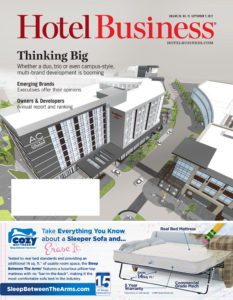 Now in his 13th year at South Carolina-based Charlestowne Hotels—nine of those as co-owner—President/COO Michael Tall has been guiding the company on a path to prosperity, doubling its portfolio of properties not once, but twice, and raising its profile within the industry.
Now in his 13th year at South Carolina-based Charlestowne Hotels—nine of those as co-owner—President/COO Michael Tall has been guiding the company on a path to prosperity, doubling its portfolio of properties not once, but twice, and raising its profile within the industry.
A firm believer in “hiring right,” Tall has shaped Charlestowne by bringing in top talent and launching e-commerce, marketing and revenue-management initiatives.
An industry veteran, Tall previously worked for Vail Resorts’ subsidiary RockResorts as a corporate analyst, as well as director of revenue for the former The Ritz-Carlton, Rancho Mirage. Former employers also include The Savoy Group, Kiawah Island Resorts and Xerox Corp.
How is Charlestowne Hotels shaping its management portfolio to meet the needs of a diverse owner population? To answer simply—in any way we need to. We, at Charlestowne Hotels, succeed through a strategy that revolves around discernment: discerning the needs of the ownership, as well as discerning the needs of the asset itself. The result is a comprehensively tailored approach that seeks to satisfy those specific needs of both owner and asset, as well as our own needs as a management company.
What makes a property attractive to Charlestowne Hotels? Assessing the potential of a property starts with an assessment of the ownership, their goals for the asset and the resources required to accomplish those goals. The next step is to gauge whether we are equipped to deliver on the owner’s expectations. Finally, we must determine if the goals of ownership align with the goals of our company. While quality, location and budget are important factors to consider, the biggest indicator of success lies within the compatibility of our goals and the potential to develop sustainable synergy with the ownership.
One area Charlestowne Hotels is focused on is boutique properties in college towns, recently opening The Abernathy near Clemson University. Why is this direction a good fit? Charlestowne Hotels’ focus always has been to find hotels whose attributes intersect with current consumer trends and expectations. While university markets are predominantly brand-dominated, we recognized early on the unmet need for lifestyle hotels that connect with the local community and deliver an authentic sense of place. Lifestyle hotels like The Abernathy are able to harness the nostalgia of alumni and the excitement of prospective students in a way that franchised brands never will be able to replicate.
University markets don’t tend to experience the same level of fluctuation or seasonality that other markets experience during downturns and boom cycles. However, when there aren’t other, diverse demand generators in a market, it is critical to have a very close working relationship with the university. This is especially true in tertiary cities where the university is the major driver of the local economy. Also, there usually is mid-week corporate demand and higher-rated social demand for the weekends (e.g., parents’ day, commencement, athletic events, etc.).
Charlestowne also is making inroads in secondary and tertiary markets, e.g., opening The Collector Luxury Inn & Gardens in St. Augustine, FL, and readying The Bristol in Bristol, VA, to open next year. How “thirsty” are these markets for lifestyle product? We have more than one dozen boutique hotel projects in development in different markets, many of which are secondary and even tertiary markets. We’ve found consumers from smaller markets experience boutique hotels while visiting larger cities, and they then desire to have one in their town or city. This often inspires people to become first-time hotel developers or owners. These properties reflect the locale and often are an expression of civic pride. Even better, smaller markets are usually less expensive to develop and operate within.
Boutique hotel projects in smaller markets often defy industry researchers. My favorite example is The Sewanee Inn in Tennessee. A research firm told the developers they would be lucky if they could break even after opening. The project went forward in spite of this dire report and within the first full calendar year of operation we reached occupancy and average rate that most city hotels would envy, producing very healthy net-income results.
Charlestowne has been bringing lifestyle hotels to fruition via adaptive-reuse projects, and has five slated to open over the next year. How robust do you expect this to get? At least 25% of our portfolio comes from adaptive-reuse hotel properties. We’ve seen an increase in repurposed hotels within the last five years, especially in secondary and tertiary cities. We’re also seeing more public incentives that aid developers in repurposing old and obsolete structures, so the financing for these types of projects becomes more attractive. The ones we manage are consistently taking market share well above what would be regarded as fair market share. We expect the number of repurposed hotel projects to double within the next five years.
Charlestowne Hotels also owns and develops. How does it layer those attributes over the hotels it manages? Regardless of the type of project, we approach each from the perspective of an owner: understanding the inherent risks they may encounter, as well as the importance of adaptability and expertise in the management of the asset. By focusing on the distinctive attributes of each individual asset, coupled with the ownership’s top objectives, we are able to curate a tailored approach that drives tangible result.
Where do you see opportunity ahead for Charlestowne Hotels? The industry is moving toward providing a unique experience in every hotel stay, even if it’s a business trip. The beauty in this movement is we have built our company around ensuring each of our hotels develops [its]own brand, not the Charlestowne Hotels brand. The hotels are the stars and we are simply the engine that helps them shine. HB

